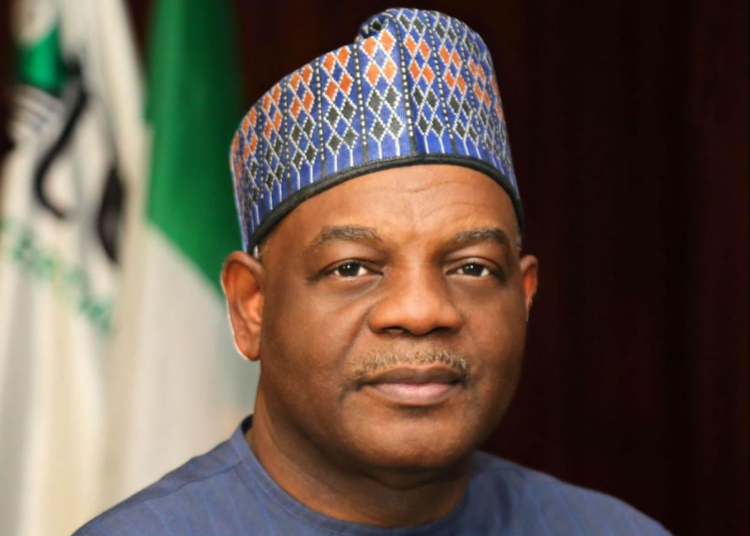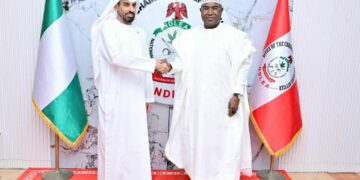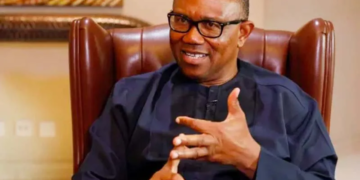The Executive Secretary of the Tertiary Education Trust Fund (TETFund), Arch. Sonny Echono has
emphasised the future of Nigeria’s public universities rests on the foundation of effective, transparent leadership and governance.
In a keynote address delivered at the 36th Convocation Ceremony of the Federal University of Technology, Owerri, Echono said leadership and governance are integral to overcoming the challenges facing Nigeria’s higher education system and ensuring its long-term development.
He stated that leadership and governance are pivotal to organizational success and societal progress. However, he also cautioned that ineffective leadership could act as a major impediment to the advancement of universities.
“Leadership is not just a title. It is a responsibility. It is not merely about directing others, but about inspiring, guiding, and serving those who place their trust in you. It is about the responsibilities we carry and the example we set.”
He argued that effective leadership goes beyond managing operations or making day-to-day decisions. True leadership, he continued, is about shaping a clear vision for the future, setting direction, and making choices that have a lasting impact on the organization and society.
“At its core, leadership is about taking responsibility,” Echono emphasized. “Leaders must bear the weight of their decisions with integrity. They are entrusted with the welfare of others, and that requires transparency, accountability, and the courage to make difficult choices.”
Echono stressed that leadership should be rooted in service to others, not a command-and-control mentality. “A leader must understand that their role is not to command from above, but to serve the needs of those they lead,” he added.
He further elaborated on the qualities that make a good leader, noting that leadership is not solely about expertise or position but about how one engages with others, inspires confidence, and earns respect. “A great leader is someone who can see the bigger picture and inspire others to work toward a common goal, even in the face of adversity.”
Echono described leadership as having the foresight to anticipate challenges, adapt to change, and maintain focus despite uncertainty. He said, “Leaders must have a clear vision of where they want to go and inspire others to follow.” Visionary leadership is not just about leading in the present; it is also about preparing for the future. “Governance, at its best, reflects leadership that is not only focused on managing the present but also on anticipating and preparing for the future,” he noted.
According to Echono, leadership provides governance with its moral compass and dynamic energy, while governance ensures that leadership remains accountable, transparent, and committed to the well-being of those it serves. “Leadership and governance are two sides of the same coin.
“Effective leadership fosters strong governance, and good governance enhances the ability of leaders to serve their communities and organizations.”
Echono also emphasized the need for transparency and accountability in the selection of leadership within universities. “There should be accountability on the part of decision-makers during the leadership selection process,” he said. He proposed the establishment of clear criteria for leadership appointments to ensure a transparent process. Additionally, he called for a strengthened autonomy for universities to minimize political interference, which often undermines the effectiveness of governance.
He also recommended the introduction of an independent monitoring mechanism during the leadership selection process. This would ensure that guidelines are adhered to and promote trust in the system. “Promoting stakeholder engagement to enhance trust in the process is essential,” Echono added.
The Need For Strategic Investments In Higher Education
Echono highlighted the pressing need for more investment in Nigeria’s public universities. He noted that the country is positioned to reap demographic dividends due to its growing young population, but this potential can only be realized if there is a concerted effort to invest in higher education. “To do this, we need to invest in our people; to prepare our youths as global citizens to fill the manpower gaps in the fast-integrating global economy,” he said.
He stressed that universities play a critical role in educating future leaders and producing the high-level technical skills necessary for economic growth and development. “Universities are responsible for producing the workforce that will drive the economy forward,” he noted. He also emphasized that higher education is crucial for achieving national development goals and sustaining long-term prosperity.
In order to enhance the quality of education, Echono reiterated the need for good governance and collaborative efforts from all stakeholders. “There is a compelling need for the government, university leaders, faculty, staff, students, and everyone involved in the Public Tertiary Education Ecosystem to work together to achieve high-quality education,” he stated.
To also transform Nigeria’s higher education system, Echono urged universities to build stronger governance frameworks that promote inclusivity, transparency, and accountability. The government, he said, must be proactive in addressing the challenges faced by public universities, particularly in terms of funding, infrastructure, and leadership.
He concluded by reaffirming the importance of visionary leadership in shaping the future of Nigerian universities. He called on all stakeholders to prioritize the development of effective governance structures to ensure that public universities can fulfill their mandate of producing globally competitive graduates, advancing research, and contributing to national development.
“The success of Nigeria’s universities lies not only in their ability to provide quality education but in the leadership that guides them,” Echono concluded. “By fostering good governance, we will ensure that our universities remain beacons of learning, innovation, and progress, shaping the leaders of tomorrow.”





